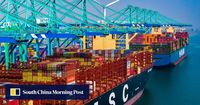Akinwumi Adesina, president of the African Development Bank Group (AfDB), has issued a stern warning to African nations regarding the implications of the ongoing global trade war, particularly in light of recent tariffs imposed by the United States. Speaking in Abuja on April 11, 2025, during the 14th convocation lecture at the National Open University of Nigeria (NOUN), Adesina urged countries on the continent to "tariff-proof" their economies and seek strategic partnerships rather than retaliate against the US tariffs.
The trade war, ignited by US President Donald Trump’s sweeping tariffs on imports, has hit African countries hard. Nigeria, for example, has faced a 14 percent tariff, while South Africa and Algeria have been subjected to 30 percent each. Mauritius has seen tariffs soar to 40 percent, and the small kingdom of Lesotho has been hit with an astonishing 50 percent tariff. In response, other nations, including China and the European Union, have retaliated with their own tariffs, further complicating the global trade landscape.
Adesina emphasized that retaliatory tariffs would be unwise for African nations, highlighting the negative consequences that could arise from such actions. "The new US tariffs could hurt African economies in several ways – weakening local currencies, increasing inflation, and making debt payments more expensive," he cautioned. He pointed out that Africa’s trade with the US is relatively small, making a trade war a poor strategy.
In his address, Adesina outlined the potential repercussions of the tariffs, stating, "The cost of servicing debt as a share of global revenue will rise as expected revenues decline. These global tariffs will also have significant indirect effects on Africa, as its exports to developed countries such as China and others in Europe and Asia will buy goods from Africa." He also noted that the Africa Growth and Opportunity Act (AGOA), which provides duty-free access for African goods to the US market, could be jeopardized.
To mitigate the impact of these tariffs, Adesina urged African nations to focus on three critical areas: increasing domestic consumption, adding value to their products, and effectively implementing the African Continental Free Trade Area (AFCTA). He stressed that the era of relying on aid is over, and that sustainable growth must come through disciplined investment, better resource management, and improved governance.
"What is needed is more trade with the US," Adesina stated. "The current dynamics call for a recalibration of trade and investment between the U.S. and Africa, which would expand trade opportunities between the two regions." He pointed out that the US has vast investment opportunities in Africa, ranging from infrastructure such as railways and ports to agriculture and critical minerals.
Adesina also highlighted the importance of investing in education, health, and technology as key sectors for Africa’s development. He remarked, "There is no doubt that development aid plays a significant role for many economies in Africa, especially providing much-needed support for vulnerable populations that deal with shocks. However, despite its benefits, aid is not the way to develop. Indeed, no nation has ever developed based on aid."
Reflecting on the COVID-19 pandemic, he emphasized the need for Africa to achieve self-sufficiency in the manufacturing of vaccines and medicines. "In a world where it is becoming increasingly difficult to know allies or where long-time allies suddenly shift their priorities, there is no substitute for self-reliance," he noted. Adesina called for increased public and private sector financing for research and development, urging that universities be equipped with world-class medical sciences facilities to drive innovations in medicine and pharmaceuticals.
Meanwhile, the broader implications of the US-China trade tensions are also weighing heavily on Africa. Experts warn that if the trade war significantly impacts China’s economy, it could have devastating effects on African nations. Countries like Lesotho, Madagascar, Botswana, Angola, and South Africa have already felt the sting of the reciprocal tariffs imposed by the US, which range from 10 percent to 50 percent.
Kai Xue, a Beijing-based corporate lawyer specializing in foreign direct investment, indicated that resource-rich South Africa and countries with established clothing manufacturing industries under AGOA, such as Kenya, Ethiopia, Mauritius, and Lesotho, could face serious repercussions. "South Africa, with a diverse set of exports to the US, is likely to be hammered if the tariffs are not rescinded," Xue stated.
As the situation continues to evolve, Adesina’s advice to African nations to prioritize strategic partnerships and bolster their economies remains critical. The call for self-reliance, investment in key sectors, and a recalibrated approach to trade with the US could provide a pathway for African nations to navigate the turbulent waters of global trade.
Ultimately, the future of Africa’s economic landscape hinges on its ability to adapt to these challenges, ensuring that the continent not only survives but thrives in an increasingly complex global environment.



